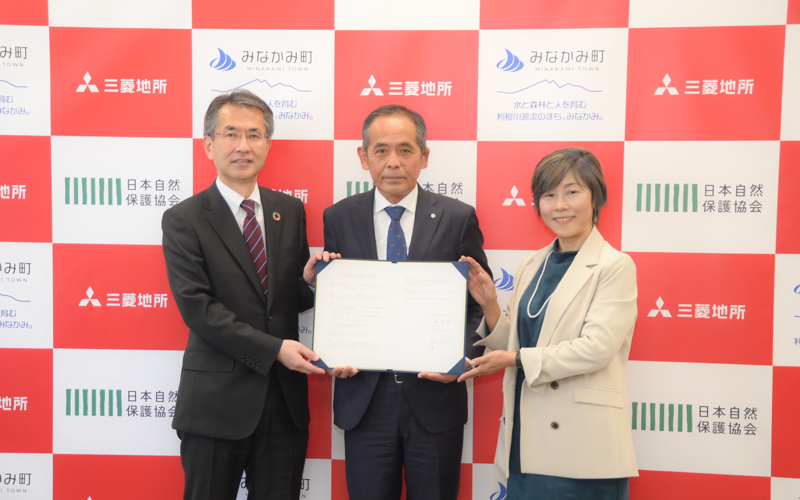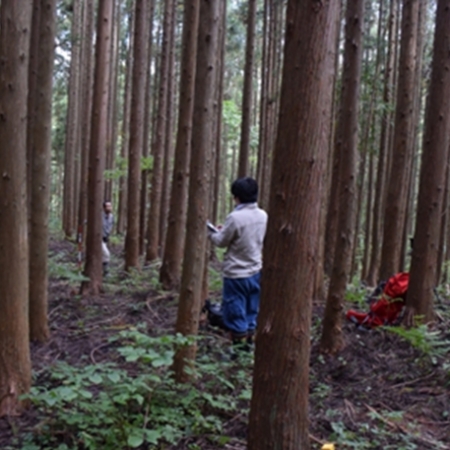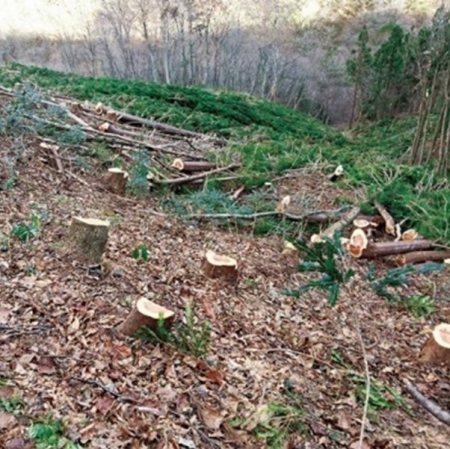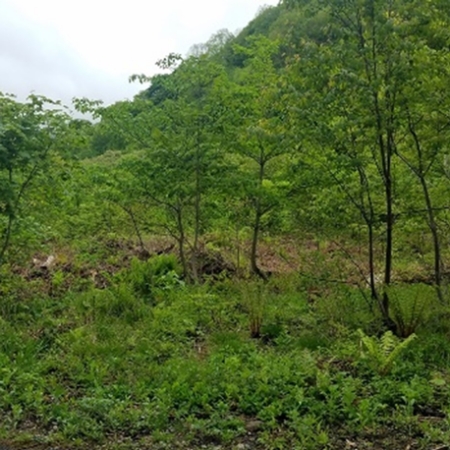Japan’s First Corporate “Hometown Tax” Utilised to Launch New Nature-Positive Initiative in Minakami Town, Gunma Prefecture
Partnership Agreement between Mitsubishi Estate, Minakami Town, and the Nature Conservation Society of Japan
2023.3.1

[Photo from left: Atsushi Nakajima, Executive Managing Officer of Mitsubishi Estate Co., Ltd.; Kenichi Abe, Mayor of Minakami Town; and Tomoko Shimura, Executive Director and Secretary-General of the Nature Conservation Society of Japan]
Read Partnership Agreement here (Japanese only)(PDF/580KB)The Nature Conservation Society of Japan (NACS-J) has launched a new initiative in Minakami Town, Gunma Prefecture aimed at achieving a nature-positive* society. In line with this, Mitsubishi Estate Co., Ltd., Minakami Town, and NACS-J signed a 10-year partnership agreement on 27 February 2023.
The loss of biodiversity, a key focus of the 15th Conference of the Parties (COP15) to the Convention on Biological Diversity, has been identified as one of the fastest accelerating global environmental risks over the next decade, alongside climate change. Addressing this challenge requires intensified efforts from all sectors of society, including governments and businesses.
*Nature-positive: Halt biodiversity loss and restore nature for the benefit of both people and the planet. At COP15, the international community identified achieving a nature-positive society by 2030 as a shared mission and established global targets to that end.
This initiative brings together three parties: Minakami Town, located at the headwaters of the Tone River, a water source for the Greater Tokyo area; Mitsubishi Estate Co., Ltd., whose business activities are centred in the Marunouchi district within the river basin; and NACS-J, an environmental NGO with expertise in biodiversity conservation and nationwide activities. By leveraging their respective expertises and working together as a unified body of business, government, and NGO, the three parties aim to conserve and restore biodiversity and contribute to the realisation of a nature-positive society.
Through the corporate version of the Hometown Tax program, Mitsubishi Estate plans to contribute JPY 600 million to Minakami Town during the length of the partnership agreement as support for environmental and biodiversity conservation activities. Amid growing global calls for mobilisation of financial resources for biodiversity conservation, this marks the first large-scale initiative in Japan to utilise the corporate Hometown Tax program for such purposes.
Main Initiatives
1. Conversion of artificial forests with degraded ecosystems into natural forests (Approx. 80 ha)
It is well known that poorly managed artificial forests have lower levels of biodiversity compared to natural forests. This initiative aims to convert such artificial forests to natural forests with native vegetation to conserve and restore biodiversity in the area. The project will target approximately 80 hectares in Minakami Town over a 10-year period, employing methods such as tree planting and improvement cutting. The activities will also be integrated with the conservation of indicator species of the ecosystem, including the golden eagle and the mountain hawk-eagle.
2. Conservation and restoration of biodiversity-rich Satoyama Landscapes
Satoyama are traditional rural landscapes shaped over centuries through interactions between people and nature. They are a distinctive feature of Japan’s natural environment, consisting of diverse habitats such as rice paddies, irrigation ponds, and grasslands that support a wide variety of flora and fauna. However, degradation of satoyama, caused by factors such as farmland abandonment and the introduction of invasive alien species, poses a serious challenge to biodiversity conservation across Japan, including Minakami Town. This initiative will focus on restoring biodiversity-rich satoyama in Minakami Town, including efforts such as removing invasive species from irrigation ponds.
3. Achieving low-density management of sika deer populations
The rapid increase of sika deer has become a nationwide issue, causing crop damage and destruction of forest ecosystems. In Minakami Town, deer populations are also on the rise, requiring urgent action. To maintain the balance of forest ecosystems and prevent biodiversity loss while also avoiding the high costs and long timelines of measures taken only after overpopulation occurs, the initiative will focus on scientific monitoring and the development of efficient capture techniques to achieve low-density management of sika deer.
4. Implementation of Nature-based Solutions (NbS)
Through initiatives (1)–(3), the project will implement Nature-based Solutions (NbS)**, harnessing biodiversity to contribute to disaster risk reduction, water source conservation, wildlife damage control, and sustainable community development. This includes exploring the utilisation of timber generated from the conversion of artificial forests to natural forests, adding value to primary products cultivated in biodiversity-rich satoyama landscapes, and making effective use of venison from deer population management. Furthermore, to foster future custodians, the project will promote civil participation and educational use, leading to increased community engagement and unique local educational initiatives.
*2 NbS: Abbreviation for “Nature-based Solutions.” Approaches to solving social challenges by leveraging nature’s own processes and systems. This concept has gained global attention and has been emphasised by the United Nations Environment Programme (UNEP).
5. Advancing and applying quantitative evaluations of biodiversity conservation and the multi-faceted functions of nature
The quantitative evaluation of biodiversity conservation efforts became a key topic at COP15 as an important step in the realization of a nature-positive society. In this initiative, we will collaborate with research institutions and universities to develop quantitative biodiversity evaluation methods that could serve as internationally leading case studies. The results of these evaluations will be utilized for periodic reports for UNESCO Biosphere Reserves, and will be shared with the international community.
Image of Planned Activities
 1) Artificial forest without sufficient maintenance
1) Artificial forest without sufficient maintenance
 2) Conversion of artificial forest into natural forest through improvement cutting and native tree-planting
2) Conversion of artificial forest into natural forest through improvement cutting and native tree-planting
 3) Forest in the process of returning to its native, natural state
3) Forest in the process of returning to its native, natural state
Signing Ceremony
Date: 27 February 2023
Comments from the parties
-
ABE Kenichi, Minakami Town Mayor
Forests and water are the most representative natural resources of Minakami Town. For forests, under the SDGs Future City Initiative, we have placed the Circular Forest Resources Project at the centre of our efforts. The project mainly promotes self-sufficient forestry—a small-scale management approach that achieves a high level of both profitability and environmental conservation. We expect that the goal of converting artificial forests to natural forests will further advance this project. As for water, the Tonegawa River, which flows from Mt. Ōminakami, supports the lives of 30 million people in the Tokyo metropolitan area. In recent years, damage to undergrowth caused by deer has affected water recharge at times, which we recognise as a serious issue. We are confident that this agreement will indeed help to solve such challenges facing the town. Going forward, we will continue to advance sustainable community development where people and the natural environment coexist in harmony.
-
SHIMURA Tomoko, Executive Director and Secretary-General of the Nature Conservation Society of Japan
Our relationship with Minakami Town began about 30 years ago, when we encountered a pair of golden eagles soaring over the snowy mountains. It was possible that the area served as a nesting and breeding site for this endangered species, which carries significant importance for biodiversity. By looking at the region from the same birds-eye view as the golden eagles, our activities have expanded beyond conventional conservation efforts, and through much trial and error, we have pursued a series of cutting-edge initiatives in nature conservation. This new agreement represents a further step forward. There is still much we do not understand about the mechanisms of nature, but we believe it is absolutely necessary to reverse the trend of biodiversity loss. At NACS-J, we are committed to building from local initiatives to realise a Nature Positive society in Japan.
-
NAKAJIMA Atsushi, Executive Managing Director of Mitsubishi Estate Co., Ltd.
As a corporation, we are expected to take the initiative in disclosing information on the risks and opportunities related to natural capital, and in pursuing business activities that contribute to achieving a Nature Positive society. In particular, since real estate development can sometimes involve altering the natural environment, we believe it is extremely important to pay closer attention to natural capital, to contribute to its restoration, and to explain these efforts to society. At the same time, there are things that cannot be accomplished with our expertise alone. That is why we consider it essential to work with proactive government bodies, as well as with scholars and NGOs who have the necessary knowledge and experience. Over the coming 10 years of activities, we may face many challenges, but we believe it is important to move forward steadily, step by step, through the collaboration of our three parties.
Reference

Minakami Town
Located in the northernmost part of Gunma Prefecture, the town is 1.2 times the size of Tokyo’s 23 wards and approximately 90% of the town area is made up of forests. With its rich ecosystems, it has been designated as a UNESCO Biosphere Reserve, serving as a model region for promoting sustainable economic activities that utilise local natural resources. It is also home to the headwaters of the Tonegawa River, part of which flows through the Musashi and Arakawa water systems to support the daily lives of 30 million people in the Tokyo metropolitan area, including Marunouchi (central Tokyo).

NACS-J
Japan’s oldest environmental NGO. Mitsubishi Estate Co., Ltd. has been a corporate member since 2015, working together on initiatives such as the restoration of the waterside environment in the moats surrounding the Imperial Palace and ongoing conservation activities in Miyako Island. In Minakami Town, the two organizations have collaborated with national and local partners on the AKAYA Project, which focuses on biodiversity conservation and sustainable community development. Guided by the vision, “Making a new path for tomorrow, with the power of nature,” the organization strives to build a society where people and nature coexist, and where everyone—from infants to the elderly—can live happily surrounded by nature.

Mitsubishi Estate
A real estate developer that has been involved in urban planning for over 130 years, beginning with the central Tokyo area (Otemachi, Marunouchi, and Yurakucho districts) and expanding to various locations. The Mitsubishi Estate Group established “Sustainability Vision 2050 – Be the Ecosystem Engineers” as its goal to achieve by 2050. The vision aspires for the Group to become an “engineer” that provides places and mechanisms (= ecosystems) where diverse stakeholders with different positions can sustainably build symbiotic relationships across all aspects of the economy, environment, and society.
For further information regarding this article, please contact the below.
- Public Relations Department, Mitsubishi Estate Co., Ltd.
TEL: 03-3287-5200 - Strategic Planning Division, Minakami Town
TEL: 0278-25-5001 - Power of Nature Promotion Department, NACS-J
TEL: 03-3553-4101
Latest List
2025.12.19
Nature Positive initiative launched in Nose Town, Osaka
with support from Microsoft
In collaboration with the Foundation of Osaka Green Trust and local communities
2025.6.13
Human Depopulation May Lead to Biodiversity Loss
Findings from a Big Data Analysis of 158 Satoyama and Rural Areas Across Japan
2025.5.21